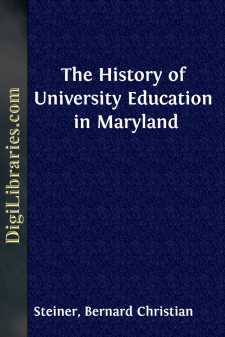Categories
- Antiques & Collectibles 13
- Architecture 36
- Art 48
- Bibles 22
- Biography & Autobiography 813
- Body, Mind & Spirit 142
- Business & Economics 28
- Children's Books 17
- Children's Fiction 14
- Computers 4
- Cooking 94
- Crafts & Hobbies 4
- Drama 346
- Education 46
- Family & Relationships 57
- Fiction 11829
- Games 19
- Gardening 17
- Health & Fitness 34
- History 1377
- House & Home 1
- Humor 147
- Juvenile Fiction 1873
- Juvenile Nonfiction 202
- Language Arts & Disciplines 88
- Law 16
- Literary Collections 686
- Literary Criticism 179
- Mathematics 13
- Medical 41
- Music 40
- Nature 179
- Non-Classifiable 1768
- Performing Arts 7
- Periodicals 1453
- Philosophy 64
- Photography 2
- Poetry 896
- Political Science 203
- Psychology 42
- Reference 154
- Religion 513
- Science 126
- Self-Help 84
- Social Science 81
- Sports & Recreation 34
- Study Aids 3
- Technology & Engineering 59
- Transportation 23
- Travel 463
- True Crime 29
The History of University Education in Maryland
Description:
Excerpt
THE HISTORY OF UNIVERSITY EDUCATION IN MARYLAND.
BY BERNARD C. STEINER.
COLONIAL ATTEMPTS TO FOUND A COLLEGE.
The State of Maryland has been almost extravagantly liberal in bestowing charters on colleges and professional schools. Over forty such charters have been given by the legislature and, in many cases, the result has proved that the gift of a charter was not warranted by the stability of the institution, to which was thus granted the power of conferring degrees. In many other cases, however, the institutions have grown and flourished, and have had an honorable history.
Collegiate education in Maryland did not begin until after the Revolution. In the colonial period there was no demand for it sufficient to warrant the establishment of a seat of higher learning. For this state of things there were several causes. The majority of the early settlers were planters and frontiersmen, having little need for an extended education and desiring it still less. Of the wealthier classes, some were like the fox-hunting English gentry, caring for little else than sport; and others, who did desire the advantages of a culture higher than that obtainable from a village schoolmaster or a private tutor, found it elsewhere. They went over to William and Mary's College in Virginia, across the ocean to England, or, in case of some Catholics like Charles Carroll, to the institutions on the continent of Europe.
But, though no college was established in colonial times, there was no lack of plans and attempts for one. In 1671, while as yet Harvard was the only American college, there was read and passed in the Upper House of the Assembly "An Act for the founding and Erecting of a School or College within this Province for the Education of Youth in Learning and Virtue." The Lower House amended and passed the bill; but the plan seems never to have progressed further. According to the bill the Lord Proprietor was "to Set out his Declaration of what Privileges and Immunities shall be Enjoyed by the Schollars;" and "the Tutors or School Masters" were to be of "the reformed Church of England" or, if two in number, to be "the one for the Catholick and other for the Protestants' Children."
A second collegiate plan was brought before the legislature in 1732; but, having passed the Upper House, was seemingly not acted on by the Lower. This proposed college was intended to be placed at Annapolis and was to offer instruction in "theology, law, medicine, and the higher branches of a collegiate education." The governor of the colony was to be its chancellor and provision was made for a faculty of five, under whom students were to be instructed in everything from their alphabet upwards.
A third unsuccessful attempt to secure the founding of a college was made in 1761, and a fourth in 1763, when contrary to the earlier course of events, the rock, on which the project was shipwrecked, was found in the Upper House. The college was to be placed at Annapolis, to occupy Governor Bladen's mansion, and to have a faculty of seven masters, who were to be provided with five servants....


